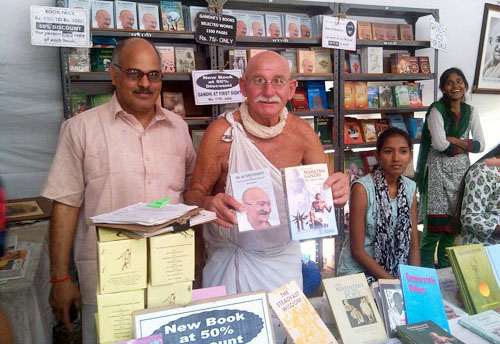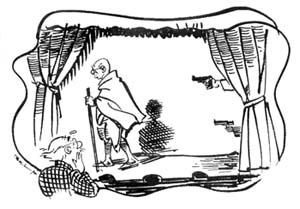Thursday, February 5, 2015
Wednesday, February 4, 2015
About 7,400 Gandhian Books worth Rs. 3.7 lakhs sold at a week-long Gandhi books exhibition in Mumbai
About 7,400 Gandhian Books worth Rs. 3.7 lakhs sold within a week
Week-long exhibition-cum-sale of Gandhi Books organized by Bombay Sarvodaya Mandal to commemorate 67th Gandhi death anniversary
 Mr. Marciniak from France, who dresses up like Mahatma Gandhi, visited Gandhi books exhibition
Mr. Marciniak from France, who dresses up like Mahatma Gandhi, visited Gandhi books exhibition
In the present world, full of modern technologies like i-phones, tabs and e-books, it is difficult to believe that many people still interested in buying Gandhi books. But a week-long exhibition-cum-sale of Gandhi Books proves that Gandhiji's teachings are relevant than ever.
About 7,400 Gandhi-Vinoba-Sarvodaya books (in English, Hindi, Marathi, Gujarati) worth about Rs. 3.7 lakhs were sold within seven days at the books exhibition. It was organized by Bombay Sarvodaya Mandal and Gandhi Book Centre with the financial assistance from ‘Babulnath Mandir Charities’ and ‘Mahalaxmi Mandir Charities’ at Hutatma Chowk and Gandhi Book Centre at Nana Chowk from 27th January to 3rd February to commemorate 67th death anniversary of Mahatma Gandhi.

Tuesday, February 3, 2015
Monday, February 2, 2015
Gandhi Journal Article-I : Assassination of Gandhi-The Facts Behind
Assassination of Gandhi-The Facts Behind

The killer of Gandhiji and his apologists sought to justify the assassination on the following arguments:
1. Gandhiji supported the idea of a separate state for Muslims. In a sense he was responsible for the creation of Pakistan.
2. In spite of the Pakistani aggression in Kashmir, Gandhiji fasted to compel the government of India to release an amount of Rs. 55 crores due to Pakistan.
3. The belligerence of Muslims was a result of Gandhiji's policy of appeasement.
Scrutinized in the light of the recorded history these prove to be clever distortions to misguide the gullible. Gandhiji in those days was very active in the rough and tumble of politics. The proposal for partition of the country and violent reaction against it generated tensions which ultimately resulted in sectarian killings on a scale unprecedented in human history. For the ethnic Muslims, Gandhiji was a Hindu leader who opposed creation of Pakistan on sectarian grounds. Ethnic Hindus looked upon him as an impediment of their plan to revenge the atrocities on Hindus. Godse was a child of this extremist thinking.

Subscribe to:
Comments (Atom)



